#Banchō Sarayashiki
Text
The Ghosts Of the Haunted Himeji Castle In Japan
Explore the supernatural stories of Japan's Magnificent Haunted Himeji Fortress and find out why this iconic castle is said to be haunted by both monsters and tragic ghosts.
Explore the supernatural stories of Japan’s Magnificent Haunted Himeji Castle and find out why this iconic castle is said to be haunted by both monsters from the Japanese Folklore and tragic ghosts from the castle’s history.
Himeji Castle (姫路城) in Japan is widely known for its grandeur and beauty and one of the countries most recognizable landmark, and a perfect place to watch the cherry…

View On WordPress
#1000#1300s#1500s#article#asia#Banchō Sarayashiki#featured#female ghost#haunted castle#himeji castle#japan#onryo#osakabehime#yokai
19 notes
·
View notes
Photo

Sarayashiki (The House of Broken Plates), from the series One Hundred Ghost Tales
by Katsushika Hokusai 葛飾北斎
1831-1832
woodblock print, via Smithsonian National Museum of Asian Art
#ghost#one hundred ghost tales#hyaku monogatari#yurei#japanese art#asian art#edo period#katsushika hokusai#ghost story#Banchō Sarayashiki#kaidan#japanese folklore#japanese folktake
119 notes
·
View notes
Text
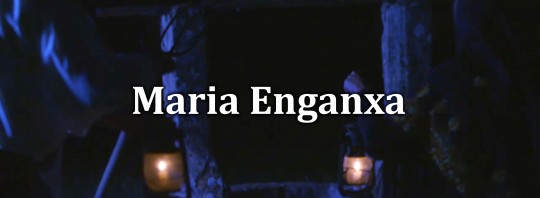

If you have ever looked at the water at the bottom of a well, you may have seen little bubbles that emerge to the surface. According to these legends from the Balearic Islands, you have seen proof that Maria Enganxa is there: those bubbles were her breathing.
In Balearic legends, Maria Enganxa (a name that could be translated from Catalan as "Mary Hooks") is a character who lives inside wells, cisterns and the underground tunnels that connect them. She has a long hook or a hand shaped like a hook that she uses to kidnap children who go near wells when their parents aren't around. These children are never heard of again.
There are different stories that explain her origin. One says that she used to be a beautiful young girl, but a witch was jealous of her and cursed her to remain underwater.
In Catalonia, legends about Maria Enganxa or Maria Ganxos exists in the Priorat and Segrià areas, where she is said to have been a real woman. She knew how to use medicinal herbs to cure all kinds of illnesses, but she also enjoyed making those who disliked her suffer: she would make cows' milk go sour, destroyed harvests and dry up the fruit trees. Seeing the situation, she was imprisoned but she escaped jail with her magic. Angry townspeople searched for her everywhere, until they found her in a field, in front of a well. Seeing she was about to be attacked, Maria said she would get revenge, particularly against children, and then jumped inside the well to avoid getting caught.
For generations, the figure of Maria Enganxa has been used to scare children to avoid getting too close to wells without supervision. The reason is that it was not that uncommon for children to have an accident and fall down the well. Other cultures have similar figures of someone inside wells who pulls children down, for example Maria Gancha from Minho (Portugal), the Marabbecca from Sicily, or the story of Banchō Sarayashiki from Japan.
#maria enganxa#llegendes#illes balears#mallorca#legends#boogeymen#mythology#folklore#urban legends#creepy#scary#witch#european folklore#myth#halloween#spooky season#minho#sicily#japanese mythology
45 notes
·
View notes
Text
yūrei
Yūrei are figures in Japanese folklore analogous to the Western model of ghosts. The name consists of two kanji, 幽 (yū), meaning "faint" or "dim" and 霊 (rei), meaning "soul" or "spirit". Alternative names include 亡霊 (Bōrei), meaning ruined or departed spirit, 死霊 (Shiryō) meaning dead spirit, or the more encompassing 妖怪 (Yōkai) or お化け (Obake). Like their Chinese, Korean and Western counterparts, they are thought to be spirits barred from a peaceful afterlife.
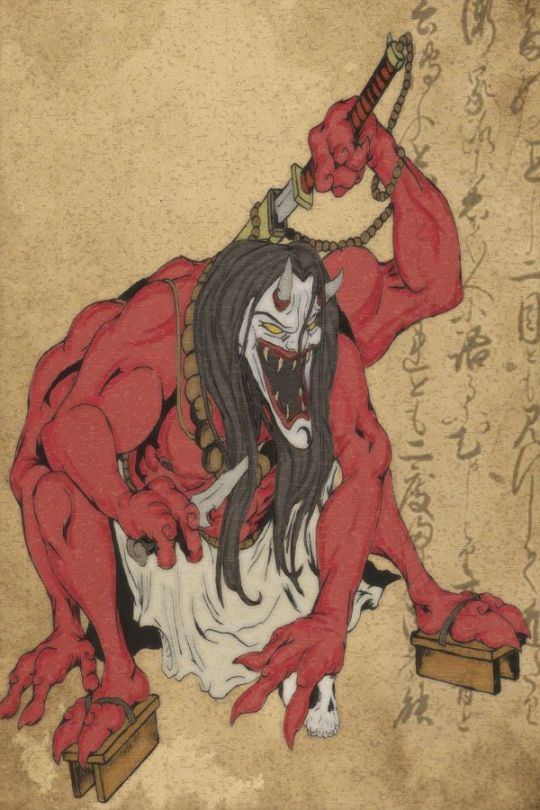
According to traditional Japanese beliefs, all humans have a spirit or soul called a reikon. When a person dies, the reikon leaves the body and enters a form of purgatory, where it waits for the proper funeral and post-funeral rites to be performed so that it may join its ancestors. If this is done correctly, the reikon is believed to be a protector of the living family and to return yearly in August during the Obon Festival to receive thanks.
If the person dies, however, in a sudden or violent manner such as murder or suicide, if the proper rites have not been performed, or if they are influenced by powerful emotions such as a desire for revenge, love, jealousy, hatred or sorrow, the reikon is believed to transform into a yūrei which can then bridge the gap back to the physical world. The emotion or thought need not be particularly strong or driven. Even innocuous thoughts can cause a death to become disturbed. Once a thought enters the mind of a dying person, their yūrei will come back to complete the action last thought of before returning to the cycle of reincarnation.
The yūrei then exists on Earth until it can be laid to rest, either by performing the missing rituals, or resolving the emotional conflict that still ties it to the physical plane. If the rituals are not completed or the conflict left unresolved, the yūrei will persist in its haunting.
Oftentimes the lower the social rank of the person who died violently or who was treated harshly during life, the more powerful as a yūrei they would return. This is illustrated in the fate of Oiwa in the story Yotsuya Kaidan, or the servant Okiku in Banchō Sarayashiki.
7 notes
·
View notes
Text
instagram
Episode Thirty-Four: Japanese Curses & Urban Legends Photodump
Image 01: Onryō (illustration by Matthew Meyer from yokai.com); Keisuke Aiso’s sculpture of an Ubume that was misappropriated as the face of the Momo hoax; Goryō (illustration by Matthew Meyer from yokai.com); Funayūrei (illustration by Matthew Meyer from yokai.com); Zashiki-warashi (illustration by Matthew Meyer from yokai.com); Another ”Funayūrei" from the Konjaku Gazu Zoku Hyakki (今昔画図続百鬼, "The Illustrated One Hundred Demons from the Present and the Past") by Japanese artist Toriyama Sekien
Image 02: Yūrei by Sawaki Sūshi (1737). Yūrei (幽霊) are figures in Japanese folklore analogous to Western notion of ghosts. The name consists of two kanji, 幽 (yū), meaning "faint" or "dim" and 霊 (rei), meaning "soul" or "spirit". Like their Chinese and Western counterparts, they are thought to be spirits kept from a peaceful afterlife.
Image 03: Ju-On (The Grudge) & The Ring
Image 04: Example of an Ikiryō: The Tale of Genji
Image 05: Example of a Jibakurei: Banchō Sarayashiki, the tale of Okiku, the samurai Aoyama Tessan, and the ten plates. (left: Tsukioka Yoshitoshi's portrait of Okiku. Right: An ukiyo-e print by Hokusai depicting Okiku)
Image 06: The Red Room part 1
Image 07: The Red Room part 2
Image 08: Kuchisake-onna aka The Slit Mouth Woman - conversation diagram and a still from the movie Kuchisake-onna, 2007 © Tornado Film K.K. / Hanako-san, or Toire no Hanako-san (トイレのはなこさん, "Hanako of the Toilet") - Hanako-san, as depicted on amino apps . com
Image 09: Donnie from the Wild Thornberries
Image 10: Reikan (taken from Tara Devlin’s Kowabana podcast) Vs. Reikon (taken from Wikipedia)
#Japanese Curses & Urban Legends#Let's Get Haunted#Yūrei#Onryō#Kuchisake-onna#Reikan#Episode 34#Instagram
2 notes
·
View notes
Text
If this unreliable self can become someone... - Part 1 (Annotated Edition)
Toji wakes from his nap to a thief running off with his things. He can deal with it, until it turns out the thief is haunted, until it turns out the thief reminds Toji of the person he hates the most. [Edo AU]
read on AO3
read on FFn
Because I’m a complete nerd, and also because I love doing useless stuff, I decided to spend hours on research for the sake of (checks notes) a niche fanfiction for a shounen manga. So now I just have to share some of that.
This post details some of the historical background littering the setting of this story, as well as explanations on a few of my writing choices. Mostly historical stuff, though. Edo-era Japan cool.
So here goes !
Ghosts and fights are the flowers of ???
It’s something of a habit for me to overthink titles, and this series is no exception. For this first part, the title comes from the Edo-era saying “Fires and fights are the flowers of Edoˮ (火事と喧嘩は江戸の華), referring to the great amount of city fires that tended to strike the city, and the reputation of Edo inhabitants as, uh, let’s say a rowdy bunch.
For the title, I adjusted the saying to fit with the events of this story, since it features more ghosts than fires, and doesn’t take place in Edo. Actually, I don’t know where it takes place (hence the “???”) – or rather, I decided not to have any specific setting in mind, to save myself from the geographic research I would probably end up doing otherwise. I just know I would’ve spent hours on it, just for the sake of namedropping a single street, because I don’t know what restraint is. As you can probably gather by the existence of this commentary track orz
Speaking of titles, I had to come up with a series title as well, which. I hadn’t thought about until like, 10 minutes before posting. I ended up settling for an excerpt of the lyrics to Sakayume, the end credit song to the JJK 0 movie. It fits pretty well, I think !
“That’s a brat alright […]. Could be fifteen, could be twenty-five.”
Toji strikes me as the kind of person who calls anyone younger than him a brat, and anyone older an old fart. So this word choice is less an indication of Yuuta’s actual age in this, than of Toji being rude. I don’t actually know Yuuta’s exact age in this part, but I’d say he’s probably around 16.
“… A vengeful ghost.”
Other than the time-period, and Yuuta’s age having been moved up by about ten years, there’s one last Big Change in the setting, and it’s the fact that there are no Curses. Instead, I decided to lean more into traditional mythology, and to make Toji suspect that Rika is a vengeful ghost, or onryō (怨霊). Typically, these are victims of a crime or a grave injustice, but sometimes they may also simply have died young. The common thread between them is that they hold a grudge (as is indicated in the 怨 part of the name), which is the root of their haunting the world of the living.
So uh, Toji is wrong, actually. Not that he really has a way of knowing it yet.
The “no Curses” thing also means that Cursed Energy doesn’t exist, and so neither do Cursed Techniques nor Heavenly Restriction.
Okiku
We don’t have a name for Megumi’s mom, so I had to make one up. Women’s names during the Edo era were typically two-syllables long (the お (hiragana O) prefix being a honorific one rather than part of the name), and after taking some time to think it over, I decided to make a reference to a famous ghost story with the name of our dearest dead mom.
The story, known as Banchō Sarayashiki (番町皿屋敷) is that of Okiku (お菊), a servant at a noble house. For breaking a plate from a set of 10 (whether she actually did it depends on the version, but she is accused of it no matter what), she is beaten and thrown into a well by her master, where her ghost remains, and can be heard counting from 1 to 9, and breaking down before reaching 10. Depending on who you ask, she is either tormenting her master by loudly haunting his well, or tormenting herself by reliving the events that led to her death.
My reasons for referencing this specific story with the name of Megumi’s mom are multiple. For one, I actually just really like ghost stories /o\ But also, her memories haunts Toji like a ghost (much like Rika does Yuuta, in a way), and unlike some other famous ghosts, the Okiku from the story… doesn’t really cause harm ? She isn’t like Yotsuya Kaidan’s Oiwa, who tortured her murderous husband (good for her), or Botan Dōrō’s Otsuyu who led her lover to his death by pursuing a relationship after she had already passed away. She’s mostly just sad, and even when she isn’t and seeks revenge, she remains powerless outside of her cries, and her master can easily ignore her if he’s enough of an asshole.
Also, unlike the two aforementioned other ghosts, she is explicitly a servant, and that lower status fits really well with the way I built the character of Megumi’s mom. And, y’know, throwing a servant in a well because they broke a plate feels like a thing the Zen’in would do. Just saying.
“it would’ve been him the machikata would’ve blamed”
The machikata is uh. Basically the police. It’s more complicated than that, as technically the term “machikata” refers to an urban area, but patrol officers were called machikata-doshin (or mawarikata-doshin, depending on their specific jobs) and their direct superior was the machikata-yoriki, so it’s not uncommon to see the term “machikata” used as an almost synonym to the police.
Machibugyō (the governmental office overseeing the machikata, look I told you it was complicated) weren’t present in all cities, but only in what were called “shogunal cities” (as well as, obviously, Edo). The most complete list I could find includes : Kyoto, Osaka, Sumpu, Hakodate, Niigata, Sado, Nikkō, Kanagawa, Uraga, Shimoda, Yamada, Nara, Fushimi, Sakai, Hyōgo and Nagasaki. The number rose throughout the Tokugawa shogunate, up to 16.
So now you have a list of potential cities to imagine as the setting of this story. Except Hakodate. I am not touching Edo-era Hokkaido with a ten-foot pole.
See, this is why I decided not to choose one specific location ! I’d just never get anything done ! Can you imagine how long I’d spend trying to find a map from my chosen date (and I’d have to decide on a more specific date than “probably mid-late Tokugawa” because cities change over time) if I wanted to make sure everything fit ? For an incredibly niche fanfiction of Jump’s Latest Pretty Boys Fighting Manga ?
Conclusion, I should have gone for history instead of anthropology for my Masters sdfhgjkl
“Undoes his ponytail”
During the Edo era, the chonmage (a topknot with the top of the head shaven off), which was the hairstyle that used to be reserved for samurai, became in fashion among the common folk’s men as well. For male kids, the usual haircut was a shaven head with only a tuft of hair left at the top. Male teens, or wakashû, would have only the very top of their head shaven off, with the rest put into a topknot. A good comparison between teenage and adult hairstyles can be seen here.
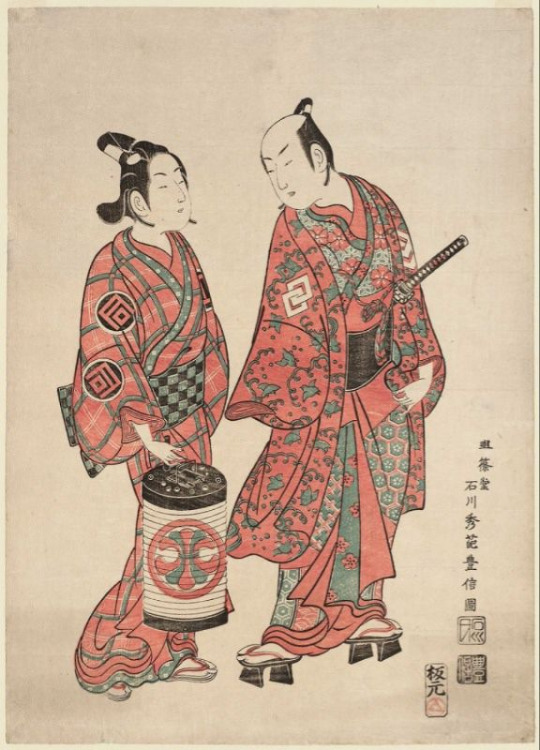
Note that the age limits of each category can vary, and I’m honestly not sure how much of teenage-hood the lower classes actually lived through, since I’ve found in my research that samurai would sometimes delay the coming-of-age ceremony as much as possible (to the point that there had be a law put in place that you Would have to be an adult by your mid-twenties), and it’s easy for me to imagine the reverse happening as well. Haven’t found specific information about the way the lower classes went through the ages of life though, so idk
Anyway the point is that Yuuta’s hair is unusual. And also that he may or may not know how to do his hair like someone his age should.
(By the way, this won’t be mentioned in any of the parts, but Toji wears his hair kinda short, at chin length, without tying it at all. Which is like, not something a guy well-inserted in Edo society does.)
“belongings tied to his shoulders”
Here are some visual examples of how people carried their stuff around :
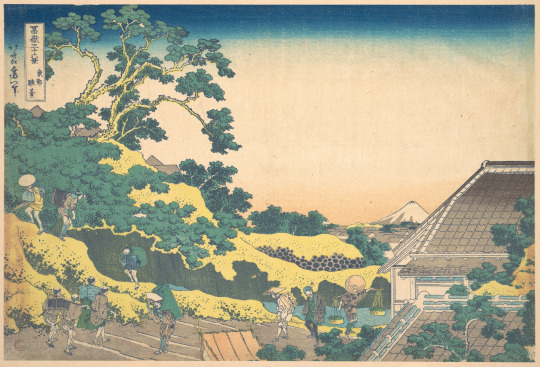
And here, the monk on the right is carrying a bundle the way Toji would be carrying his :
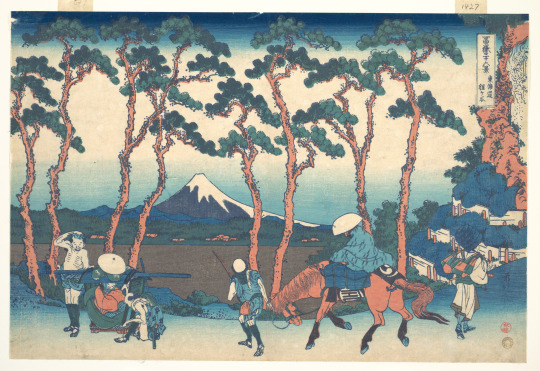
“If the brat ever calls him oniisan, Toji might just snap.”
I’m not saying Toji has the most unhealthy relationship with family a man could possibly have, but he is at the stage where a simple mention of potential blood-ties is enough to trigger his bad memories, even when that mention is just a polite way to call someone older than you, so uh. Y’know. Could be better.
This whole scene also has him calling the merchant “uncle”, which is just another polite way to call someone older, albeit when the age difference is bigger and/or when the person you’re talking to is at least middle-aged.
See, Toji can be polite when he wants ! Granted, it’s only when he has something to gain from it, but that’s something !
Tadayoshi and Sunao
I wanted to find Zen’in names that fit the naming pattern we’ve seen thus far, with the first kanji of the children matching with their father’s, and I have to say it uh. Took me a little while. Especially since I didn’t want it to be immediately obvious to the reader who exactly these two douchebags are supposed to be, so I looked for alternative readings of the first kanji and after like, an hour, finally found something I was satisfied with.
Anyway, Tadayoshi is written 直吉, and Sunao is 直男. The second kanji of their names are “luck” and “man” respectively.
And this concludes the commentary on this first part ! See y’all next time for more overly detailed discussion of history for the sake of some niche fanfiction, featuring swords, samurai, and plants (probably) !
#jujutsu kaisen#yuta okkotsu#yuuta okkotsu#okkotsu yuuta#fushiguro toji#toji fushiguro#rika orimoto#orimoto rika#yumi writes#manifesto commentary#i originally wanted this fic to be like#a way to get other folks into this dynamic#hence the 'manifesto'#but it might have ended up too niche for that#compels me tho#which is what matters in the end#jjk edo AU
7 notes
·
View notes
Text
Carnal Knowledge
Braydon and Belinda talk about two different paranormal stories in today's episode. Braydon discusses the legend of Banchō Sarayashiki in Japan, which is the original inspiration for the world famous movie, The Ring. The legend originates from Himeji Castle in Himeji, Japan, and is incredibly well known through the countless adaptations, plays, and artwork that feature the fable.
Braydon also goes on to talk about the Shirime spirit, which has a dirty little secret, and a supposedly haunted location within Japan that he has already visited!
Belinda goes on to talk about the exorcism of Michael Taylor, who joined a church group and grew obsessed with the young pastor who lead the group. His obsession turned nasty, when he reportedly was possessed by 40 separate demons, and the demons manifested themselves through his physical form. He went on to attack the pastor, and murder someone close to him. All is detailed in this episode of YMAAP.
If you wanted to follow us on social media, we can be found on: Facebook, and on Instagram You, Me, and a Poltergeist, Braydon, Belinda
CHECK OUT ALL THE OTHER PODCAST ON TNC: THATSNOTCANON.COM
#paranormal#ghost#haunted#spooky#horror#mindreading#seance#medium#podcast#Paranormal#Comedy#Podcast#You Me And A Poltergeist#Spooky#Haunted#Exorcism#Banchō Sarayashiki#Japan#Ghost#The Ring#Ring#Creepy#Funny#Hilarious#Michael Taylor#Scary#ghost story#haunting#the grudge
1 note
·
View note
Text
Hideo Nakata’s restored Ring (1998) re-released in UK cinemas and on Blu-ray
To celebrate its 20th anniversary, Arrow Films’ restoration of Hideo Nakata’s Ring (1998) is being released in cinemas across the UK from March 1st. Check here for showings.
The film will be available on Digital, DVD, Blu-ray, Limited Edition Steelbook, and a special Limited Edition Collection featuring Ring, Ring 2, Ring 0 and Spiral on March 18th.
Limited Edition Collection Extras:
Limited…
View On WordPress
#1998#Banchō Sarayashiki#film#Hideo Nakata#Hiroyuki Sanada#horror#Japanese#movie#Nanako Matsushima#review#reviews#Rikiya Ōtaka#Sadako
2 notes
·
View notes
Text
think there's a flaw in my code
Leo escapes from a botched mission and crosses paths with a familiar face.
Title taken from the song Gasoline by Halsey.
Prompt: Assassination
(warnings for graphic depictions of violence, emotional manipulation, gore, death, guns, injuries, implied brainwashing/mind control)
Inspired by events in TMNT: Hero Micro #4 Leonardo. Leo's gauntlet is named Okiku after the vengeful ghost from Banchō Sarayashiki.
____
Leo leaps out of a window with blood on his hands and more streaming from his leg, the sound of gunfire drowning out a dead man's gurgles. The impact makes him cry out in pain, but he jumps his fingers in his mouth at the last second, muffling the sound.
More shouts and he's off again, sprinting down the alley. Walls flash by, sometimes turning into trees, but he doesn't think about that too hard. The fear, the pain, the whispers and shadows--he bundles it all away into the furnace at the back of his mind and sets it alight, lets the fire burn through his veins and drive him along.
The men following him have cars and guns, but Leo is quick, and quiet, and all too used to being hunted. He pushes himself deeper into the nooks and crannies of New York, one hand pressed firmly to his leg to keep the blood from leaving a trail. The bite and strain in his leg keeps his head clear, something to focus on other than--
Laughing, running, exploring, testing out their new legs like wobbly colts. The city was their playground and all they could see was the wonders it held; all they could hear was each other's laughter lighting up the dark.
Leo snarls to himself, picking up the pace even though it makes everything hurt more. He deserves it, he knows better than to let himself get distracted. He thrusts himself into a particular tight gap, wincing as the wall scrapes at his sensitive scutes.
The voices draw near and he freezes, caught between two buildings. The sound of wheels, voices yelling, cursing, waving around their guns. So noisy. So careless. If someone hadn't tipped them off to surprise him in his target's office, Leo could have taken them all down with ease.
Instead, he's forced to wait, taking slow and careful breaths. His heart is pounding, but that doesn't matter. Leo's not scared, not really. To bleed for his master, to die for his master, is a blessing, not a curse.
Still, it would do his master no good for him to die at the hands of these idiots, so Leo wills himself to become part of the shadows. To sink into the stone--
into the wood scratching his back, digging into his skin. His clothes are stained with sweat and blood, dark hair slipping from its knot. The men are coming closer, and he wills his hands not to shake. He needs to get out of here fast, get back to--
.... What?
The--whatever it was--is gone, melting from his brain like dewdrops in the morning. And so are the men, although they're much more dramatic about it, yowling their little threats as they stomp or roar away.
Leo blinks, clearing his eyes. His head hurts, and he can't quite remember what he was thinking of. He's alone, now, alone physically and alone in his mind, and the thought makes him ache just a little in a way he can't put his finger on.
But there's more blood on his leg, pushing through his fingers, and he's still not out of the proverbial woods yet. Right now, the order of his business is getting back to base, getting patched out, finding out whoever betrayed him to the enemy and giving them a slow death. He can talk to Mistress Kitsune about his...issues later on.
Getting through the alley is a bit more trouble than it expected; especially when he starts to narrow at the end. Leo does some of his own cursing before he finally manages to stagger out, pausing to rip off some of his wrappings and use them as a makeshift bandage. That'll hold him until he gets home, at least.
Leo straightens up, scanning the surrounding walls for the best way back to the roof, when he hears a soft gasp. He whirls, one hand flying to his swords while the other unsheathes Okiku, claws glinting bright and lethal.
A bundle of clothes in the corner has sat up and become a woman, pushing tangled brown hair out of her face. Leo takes a breath and puts his blades away, letting himself relax. It's just a homeless woman; if he leaves now, she'll probably think he was just a dream and if she doesn't, no one would believe her.
"Good evening," he says, bowing to her, because she's no enemy of his and being spattered in blood isn't an excuse to be rude. "Apologies for disturbing you, ma'am. I'll be on my way."
He starts to turn away (maybe he'll come back, leave her some food like he used to with ) but then she says, "It's you."
And Leo knows she's probably just rambling, but something in him stiffens anyway.
The woman lurches to her feet, peering at him with surprisingly keen eyes. "From the building," she says more firmly. "With the shadows. They chased you in, and you were running, and you were fighting, and you--you saved me."
She sounds so sure, and...and there's something about her voice, her face. Leo shoves the thought away. "I think you have me mistaken for someone else, ma'am," he says carefully.
"I saw you," she repeats. She takes another step towards him, voice growing more confident. "They didn't believe me, but I saw you. You were just a little turtle, but you fought them all and you went up to the roof and--and you fell." She winces, as if the memory stings her.
And he's plummeting again, wind whipping through his mask tails, bleeding and shamed and so terrified it took his breath away before the dumpster could. Falling and falling and falling, until he wondered if there had ever been such a thing as solid ground at all. One hand strays automatically to his throat, tracing the memory of a hand.
Have I trained you so poorly? the rat had said, before casting him done. And...and then Master Shredder had caught him, had saved him, not the dumpster. Why was he thinking about a dumpster?
"The rat," he asks, and he doesn't know why he's saying it in such a way, why it seems to matter so much. "Did you see a rat there?"
She shakes her head. "No rat, no rat. Just you and the shadows."
"You're wrong," he says. "The rat was there." The rat was there, had to be. Leo remembers the mad red glint of his eyes, remembers the contempt, the betrayal, so why--
"Leonardo?"
The voice looms out of nowhere and Leo jolts, almost falling as he hastily bows. "Master Shredder!" The woman squeaks, lurching into her corner, and Leo ignores the sudden urge to stand in front of her, to shield her from view. His Master is here, now, which means everything is alright.
Master Shredder leaps down to join them, landing lightly and silently despite his heavy armor. "We found the traitor," he says, putting a reassuring hand on Leo's shoulder. "I am pleased to see you succeeded despite his efforts." His voice is warm, his eyes more so, and he gives Leo a light squeeze.
"Only because of your training, Master," Leo says. He can feel the confusion slipping away, replaced by strength and surety. Just looking into his master's eyes makes everything so much clearer.
But then the woman whimpers, and Master Shredder's eyes flicker in her direction. He frowns, cocking his head. "Who is that?"
"Shadow," the woman whispers, pressing her back against the wall. "Shadows..."
"No one," Leo says quickly. "Come on, Master. She'll fall asleep and forget about us, and if she tells anyone they won't believe her."
His Master gives him a look of disappointment, and Leo's gut twists at the sight. "There are plenty of people in this city willing to believe in the existence of a talking turtle or a man in armor, chunin." He shakes his head. "Didn't I teach you better than that?"
Have I trained you so poorly?
Leo squirms, flushed with shame. "Master..."
"You know what you have to do," his master says. "Make it quick, put her out of her misery."
No. Denial rears up in him so quickly that he almost--almost--says it aloud. Leo swallows hard, fists clenched at his side. He glances over at the woman, shaking with muffled sobs as she tries to bury herself in the corner.
"Leonardo." His master's gaze pins him in place. "I gave you an order."
He did, didn't he? And he...he's Leo's master, the one who's taken care of him in so many ways, the one who's given him everything and asked for almost nothing in return. The one who loves Leo, in a way Leo didn't think anyone could ever love him again after the rat betrayed and the fire swallowed his brothers up.
Leo has to trust him. He wants to trust him.
So instead of making any more excuses, he turns and makes his way towards the sobbing woman. He's limping a little, enough for any experienced fighter to unbalance him, but she just sobs harder.
"Please..." she begs. Okiku's claws are unsheathed again, and they feel heavier than they did a second before. "You saved me! I know you did!"
Leo freezes, heart skipping to a halt.
"Delusional, but still dangerous," Master Shredder says, his voice filling up Leo's head like it always belonged there. "Go on, Leonardo."
His hands move and--
Blood steel she's falling mother is Falling down they plummet together blood stains the floor soaks his hands the babies cry she looks at him begs and he wants to reach for her but he can't move the steel weighs him down her stomach unfolds like bird wings and guts spill across the floor.
He opens his mouth to scream--and then it's gone, gone, all gone, ripped out from under him. He stumbles again and this time he falls. But Master Shredder catches him, same as he always does.
"...Master?" His voice is small, confused. His head is ringing. The dead woman lies on the ground, blood pumping from her throat (not the gut, why) as Okiku's claws slide back into the sheath.
Red smile on her throat, red teeth, red steel. A smile caught in the woods; long black hair interwoven with brown. He opens his mouth and there is nothing, nothing but the press of his Master's arms and an aching numbness in his head where the unnamable used to be.
"You did well, Leonardo," his master says, and his voice is a light in the darkness. Leo lets himself be drawn to it (there's a saying about moths and flames, right? he can't remember how it goes). He feels himself be hoisted up, a soothing hand rubbing along his shell.
"Let's go home," his master says. Home. Yeah. Home is good. "Mistress Kitsune can tend to you, and then we can tend to our little traitor." He snickers gently, cloak rustling as he carries Leo towards the roof.
Tending. More blood, more pain, more death--but all in the name of the clan, of the master who loved him. So that means it has to be okay.
He turns his head for one last look back at the woman he'd killed, but the shadows have swallowed her up. All Leo sees is the faintest gleam of red as Master Shredder carries him away.
You saved me, she had said.
She was wrong. Leo doesn't save anyone. He closes his eyes and lets himself be carried away.
#leonardo#leo#tmnt#tmnt idw#teenage mutant ninja turtles#oroku saki#shredder#city fall#mafia madness#assassination#march madness#gore#tw violence#tw death#tmnt comics#amow mafia madness#amow
4 notes
·
View notes
Note
Regarding Nathalie: there's a Japanese legend of the Banchō Sarayashiki, which is the ghost of an unjustly killed servant who now haunts/punishes her former master. So maybe: Emilie and Emilie's lover were both in some horrible accident; Gabriel got Emilie into life support but let the lover die. The lover has returned as Nathalie, haunting Gabriel by driving him on as Hawkmoth, pushing him to forsake everything, ruin his life, abandon family, etc., in his zeal to get Ladybug's miraculous.
Ooooh! That’s a cool idea!
For some extra Shakespeare drama let’s say that the three of them were friends, Original Nathalie was dating Emilie and Gabriel was jealous.
The accident happens- Gabriel only saves Emilie and says Nathalie’s already dead even though she was still alive and conscious.
She either dies or disappears and Emilie wakes up to her girlfriend dead and her best friend Gabriel supporting her. She’s distraught but he’s there for her and she ends up marrying him.
Now here’s something I haven’t told y’all yet.. the Graham de Vanilys.. are a monster slaying family.. Emilie didn’t take up the family business but they still were there.
Nathalie knows this of course and that’s why, despite being a ghost who’s able to touch and be “alive” she can’t do anything without risking her own after death, as she’s spite and vengeful ghost capable of danger, so she watches from a distance as the love of her life is stolen away by her murderer. Things become worse when Emilie does the falling into coma thing and Gabe does the super villain business.
So she decides to play the bad guy, to twist the story, to make Gabe fall and become the true villain he’s always been.. to make him suffer.. and to save the son that was meant to be hers.
This is some Monte Cristo shit holy fuck I don’t even know if I’m going with this but here it is I guess? Please send me more suggestions y’all!
33 notes
·
View notes
Text
Obake Karuta pt 1 Vowels
あ - A
Aosaginohi
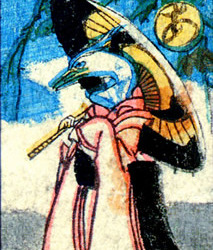
い - I
Banchō Sarayashiki of the well (ido)
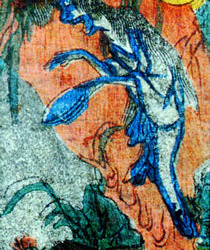
う - U
Usui Passes’ Shumoku Musume
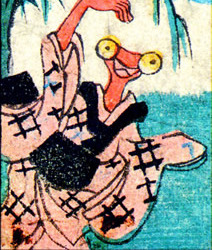
え - E
Yanari shakes the veranda (en)
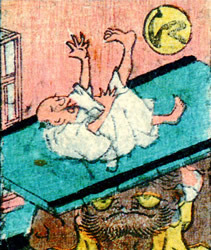
お - O
See Funayurei by every other (okini) boat
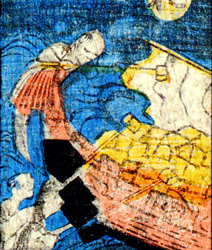
Obake Karuta posts:
Part 1 Vowels, Part 2 K, Part 3 S, Part 4 T, Part 5 N,
Part 6 H, Part 7 M, Part 8 Y, Part 9 R, Part 10 W
2 notes
·
View notes
Text
Banchō Sarayashiki — the Ghost of Okiku
One of the more well known ghost stories in Japan is of the poor servant Okiku in the ghost story Banchō Sarayashiki has become the very image of a Japanese ghost story. The girl that died in the well and comes back, forever counting the plates.
One of the more well known ghost stories in Japan is of the poor servant Okiku in the ghost story Banchō Sarayashiki has become the very image of a Japanese ghost story. The girl that died in the well and comes back, forever counting the plates of her master, hoping that one time, she won’t be missing any.
Okiku Well: by Katsushika Hokusai, most known for making the The Great Wave off Kanagawa,…
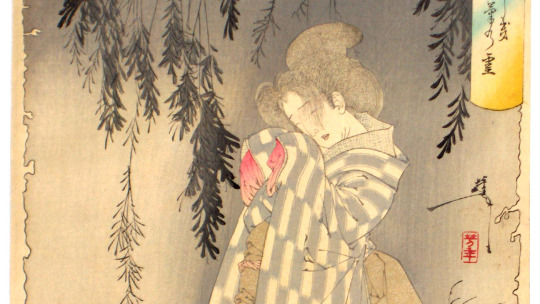
View On WordPress
#1700#a ghost story#article#asia#Banchō Sarayashiki#featured#Ghost#ghosts#haunted#haunted castle#haunting#hungry ghost#japan#Japan’s Big Three Ghost Stories#japanese ghost story#kaidan#okiko#onryo#vengeful spirit#well
2 notes
·
View notes
Text
Banchō Sarayashiki.
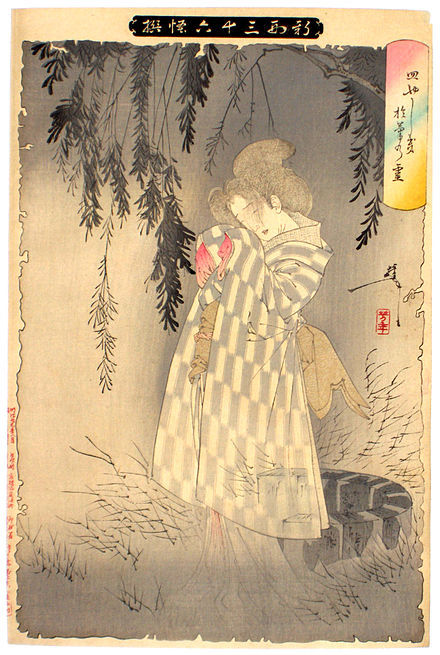
In the kabuki play Banchō Sarayashiki, Okiku is a maid at the mansion of the Japanese samurai Tessan Aoyama. The samurai wants to seduce the cute girl but she rejects his advances. Aoyama uses a trick. He hides one of ten valuable Dutch plates and threatens Okiku to make public that she had stolen the plate unless she agrees to become his mistress. In her desperation Okiku throws herself into the well and drowns.
Okiku's ghost comes out every night, counting from one to nine and then breaks out into a terrible howling and sobbing. Finally Aoyama goes insane by the daily apparitions at night.
4 notes
·
View notes
Text
Mushihime Chapter 22
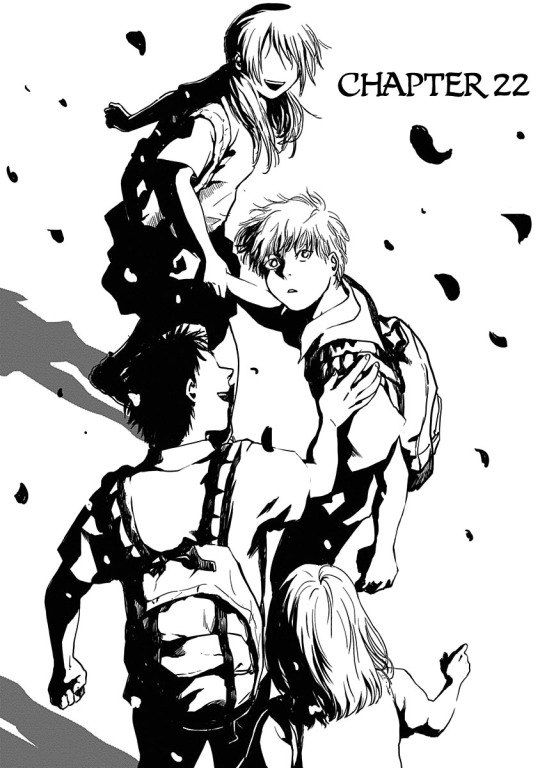
The story is starting to wind down as Ryoichi puts that thot in her place.
Read Online
Download
Patreon
Also I’d recommend reading up on Banchō Sarayashiki and Kukurihime to understand what Kuzumi is talking about.
3 notes
·
View notes
Photo
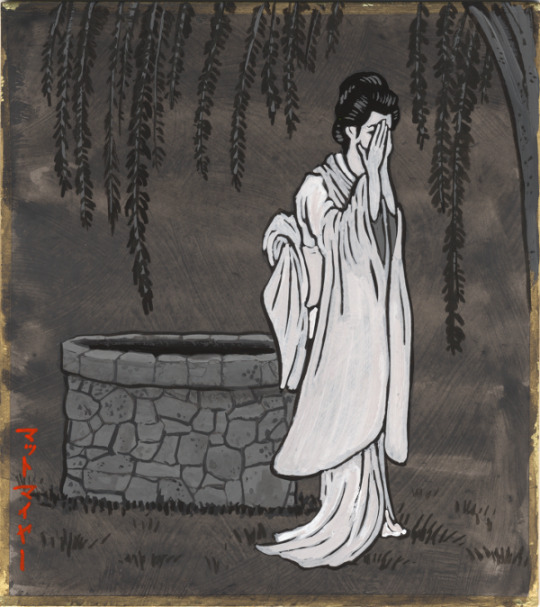
Okiku is an Onryō from the Japanese kaidan Banchō Sarayashiki. Once a beautiful serving girl, she spurned the advances of her samurai master. Enraged, he tricked her into believing she had lost one of the family's ten valuable delft plates. She went to her master to confess, and he offered to pardon her if she would become his lover. She refused, and the enraged samurai threw her down a well. She returned as a vengeful spirit, tormenting the samurai by counting to nine and then shrieking loudly.
There are various versions of the tale. In some, the hauntings end when an exorcist yelled "ten," allowing Okiku to finally rest. In other versions, Okiku is pressured into stealing the plate, or breaks the plate to test the strength of a marriage proposal.
Image source.
Monster master list.
Suggest a spook.
63 notes
·
View notes
Photo
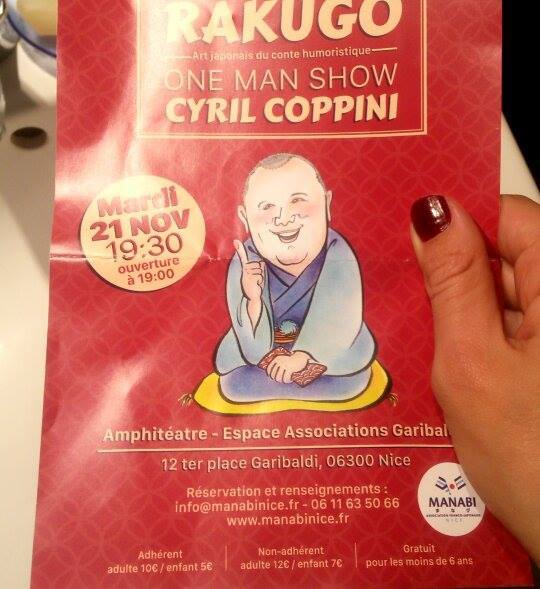
I saw it this night. It was amazing :D ! Listen Jugemu Jugemu, Banchō Sarayashiki or Chozu mawashi in French and Japanese was absolutely unique and marvellous *w*
I’m definitely in love with Rakugo ! I also advice you to watch some performances of Cyril Coppini on youtube . He plays in Japanese, French and English (I’m also proud because we’re from the same town :3). Fan of Shouwa Genroku Rakugo Shinjuu or just fan of Japanese culture…this is for you.
#rakugo#cyril coppini#upthebaguette#culture#cocorico motherfuckers#japan#france#gurako's confession#japanese culture
3 notes
·
View notes